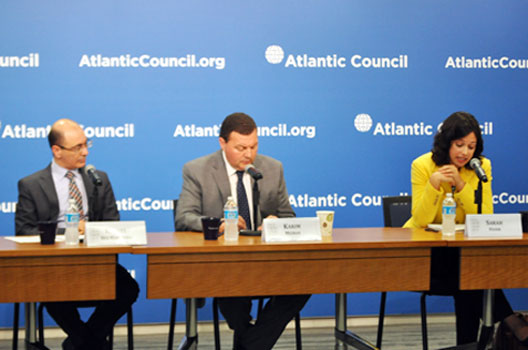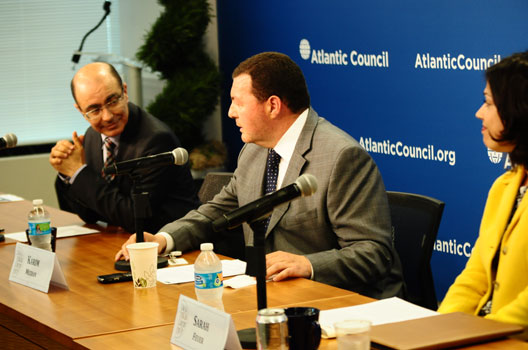 On June 3, 2015, the Atlantic Council’s Rafik Hariri Center for the Middle East hosted a roundtable to asses Tunisia’s current political and security situation and the challenges ahead. Nonresident Fellow Dr. Haykel Ben Mahfoudh and Dr. Sarah Feuer of the Washington Institute of Near East Policy shared their insights. Hariri Center’s North Africa expert Dr. Karim Mezran moderated the discussion.
On June 3, 2015, the Atlantic Council’s Rafik Hariri Center for the Middle East hosted a roundtable to asses Tunisia’s current political and security situation and the challenges ahead. Nonresident Fellow Dr. Haykel Ben Mahfoudh and Dr. Sarah Feuer of the Washington Institute of Near East Policy shared their insights. Hariri Center’s North Africa expert Dr. Karim Mezran moderated the discussion.
Ben Mahfoudh, a law professor at the University of Carthage, began by underscoring that developments in Tunisia since the 2011 revolution are an experience more than an exception. He went on to identify the areas in which the country can make progress, including security sector reform and judicial reform. Ben Mahfoudh also described a growing mobilization within civil society to reactivate transitional justice, which is essential to creating a political landscape conducive to reforms. Commenting on the political situation in Tunisia, Ben Mahfoudh explained that the current political coalition is fragile, much like the culture of consensus-building, as issues of balance of power increasingly come to the fore in governance. He pointed out that the parliament is not strong enough to assert its role as an oversight body, and there is an absence of a political reform agenda.

Feuer, an authority on state-religion relations in North Africa and a Soref Fellow at the Washington Institute, challenged the notion that Tunisia has resolved the issue of state-religion matters through the constitution. Such issues, especially in terms of religious education and regulation of religious institutions, remain contentious and unresolved. She also touched on how, historically, state control of religious institutions reduces the latter’s credibility. Feuer posed the question how that might change if the Tunisian state is increasingly seen as legitimate and reflective of public opinion, as well as how religious institutions might be coopted in efforts to counter violent extremism .
During the discussion period, attendees asked a range of questions on Tunisia’s municipal elections, higher education reform and the role of universities in monitoring radicalization, and the need for the country’s citizens to see a government strategic plan to improve security and livelihoods.
